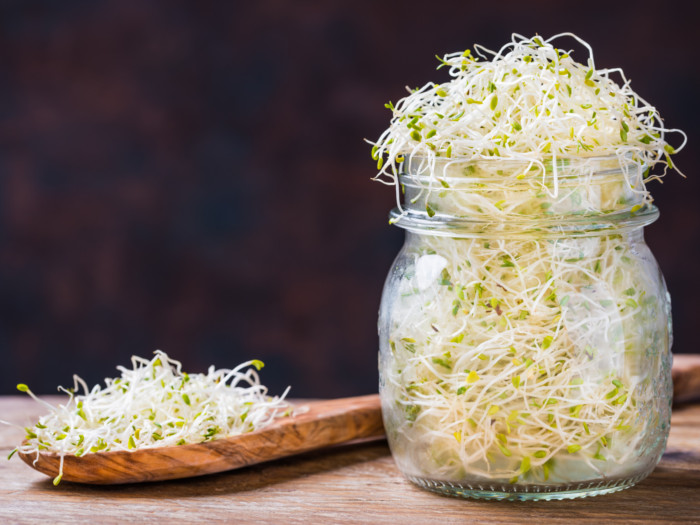Using alfalfa for hair is an excellent way to prevent hair loss and improve the overall appearance of your locks. Alfalfa, also known commonly as lucerne, is a perennial flowering plant that is native to warm, temperate climates. Most of the world’s alfalfa production occurs in North and South America.
Alfalfa grass is a common feed crop as it has more nutrition than common grass or hay, and young alfalfa sprouts can be found at most grocery stores, where they are beloved by health enthusiasts. One of the reasons for alfalfa’s nutrient density is the plant’s super long root system, which can grow to 15m deep, providing a rich base of nutrients for several cosmetic and therapeutic applications.
You can buy alfalfa in almost any supermarket or drugstore in pill form, as a dried herb, or as tea or juice powder.
Benefits of Alfalfa for Hair
In addition to its agricultural usefulness, alfalfa has long been thought to have many health benefits. Alfalfa leaves are rich in protein and vitamins A, B, C, D, E, and K. In terms of minerals, the plant contains high amounts of calcium, copper, magnesium, manganese, zinc, and selenium. Additionally, it also has good amounts of carotene and chlorophyll. No wonder, this nutrient-rich plant is used in supplement form to boost hair, skin, and nail growth. [1] [2]You can read more about them in 9 Wonderful Benefits of Alfalfa. Let’s find out how alfalfa can help hair growth and hair health.

The protein content in alfalfa sprouts may help boost hair growth. Photo Credit: Shutterstock
Hair Growth
Taken in tea or pill form usually, dried alfalfa leaf is full of vitamins A, B1, B6, C, E, and K. Vitamins B1 and B6 are particularly important to hair growth, while C and E both help improve scalp circulation. [3]
Hair Loss
Aside from its consumption as food, alfalfa is most well known as a supplement to help prevent hair loss. The dense nutrients, as mentioned above, contribute to keeping the follicles strong and healthy, thus keeping your head of hair thick! [4]
Hair Health
Alfalfa is also a wonderful way to help improve the strength of the hair and give it a healthy shine. Although many of the trials have been run on non-human primates, results from a study published in the Comparative Medicine journal reveals that alfalfa does have certain components that can treat alopecia, a condition experienced by both primates and humans. [5]
Baldness
Alfalfa also has several minerals that are key to hair health, like zinc, iron, potassium, calcium, manganese, folate, and carotene. Hair loss has been linked to a deficiency in iron, and zinc helps stimulate new hair growth by boosting your immunity. Alfalfa also contains silica, a nutrient which slows down baldness and hair loss. Silica may even help grow new hair as well. [6]
Scalp Health
Lastly, alfalfa is a good source of protein, which is the primary component that makes up human hair. Protein also encourages new hair growth and scalp health. [7]
How to Use Alfalfa for Hair?
To boost hair growth and hair health, you can include alfalfa in different ways in your diet. Here are the top suggestions. [8]
- Alfalfa juice: If you are making the juice at home, you will need almost 15 handfuls of alfalfa sprouts to get a glass of juice. It is quite potent in flavor and best had when mixed with other ingredients like cucumber, carrot, parsley, and lemon juice. You can also buy alfalfa juice powder from select health stores or online. [9]
- Alfalfa sprouts: If you are buying sprouts, look for bright crisp ones. The sprout roots should be white and the leaves should range from yellow to green. Do not use sprouts if they are brown or slimy. You use them in salads and sandwiches. You can also make your own sprouts at home with alfalfa seeds.
- Alfalfa tea: You can purchase dried alfalfa leaf tea powder from health stores. Steep the tea and enjoy a cup to enjoy the nutritional benefits of the plant.
- Alfalfa supplements or pills: Many good brands are available in the market. However, always check with your doctor before adding a herbal supplement to your daily regimen.
Potential Side Effects of Alfalfa
Because alfalfa is high in vitamin K, it is not recommended for people on blood thinners or blood medication. It should be avoided in large quantities if you are pregnant, or have suffered from an autoimmune disease like lupus.
Also, there have been several outbreaks of illness associated with alfalfa sprouts, and contamination by Salmonella and E. coli have been identified as the cause. So, make sure you purchase fresh sprouts.
